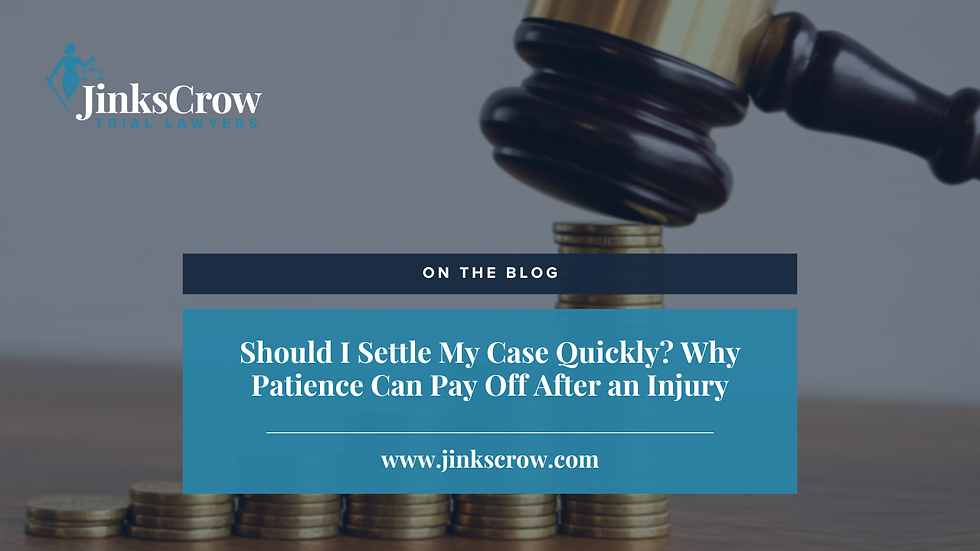Does the risk outweigh the reward? Potential Side Effects of Weight Loss Drugs like Ozempic and Wegovy
- Jinks Crow

- Sep 3, 2024
- 3 min read
Weight loss drugs like Ozempic, Mounjaro, and Wegovy have gained significant attention for their effectiveness in helping individuals achieve their weight loss goals. These medications, originally developed to treat type 2 diabetes, are now being prescribed for weight loss due to their ability to regulate appetite and promote fat loss. While these drugs can offer promising results, it’s crucial to understand the potential side effects of weight loss drugs and risks associated with their use. Litigation resulted after the FDA Adverse Event Reporting System (FAERS) revealed it had already received over 10,000 adverse event reports about semaglutide variants.

How Do Ozempic and Wegovy Work?
Ozempic and Wegovy contain semaglutide, a medication that mimics the action of the hormone GLP-1 (glucagon-like peptide-1). GLP-1 is naturally produced in the body and helps regulate blood sugar levels, slow digestion, and reduce appetite. By enhancing these effects, semaglutide can help individuals feel fuller longer, leading to reduced calorie intake and, ultimately, weight loss.
Common Side Effects
Mounjaro, Ozempic and Wegovy have side effects like many drugs. Some of the most common side effects reported by users include:
Nausea and Vomiting: Many individuals experience nausea, especially when they first start taking the medication. This can be mild to severe and may be accompanied by vomiting in some cases.
Diarrhea or Constipation: Gastrointestinal issues such as diarrhea or constipation are also common, particularly in the initial stages of treatment.
Abdominal Pain: Some users report experiencing abdominal discomfort or pain, which can be a result of slowed digestion.
Fatigue: A sense of tiredness or fatigue may occur, particularly as the body adjusts to the medication.
Serious Potential Risks
While most side effects are manageable and tend to lessen over time, there are more serious risks associated with these drugs that users should be aware of:
Pancreatitis: In rare cases, Ozempic and Wegovy have been associated with inflammation of the pancreas (pancreatitis), which can be life-threatening. Symptoms include severe abdominal pain, nausea, and vomiting.
Gastroparesis: A chronic condition where the nerves and muscles in the stomach wall severely weaken, gastroparesis makes it more difficult for the stomach to transfer food to the small intestine. Results of gastroparesis include intestinal blockages or obstruction, and it often leads to nausea and diarrhea. Furthermore, gastroparesis can’t be cured, and it can only be managed medically and surgically. This means that anyone who has developed this condition is potentially facing a lifetime of medical interventions.
Gallbladder Issues: There is a potential risk of developing gallbladder problems, including gallstones. This is because the medications can slow digestion, leading to the buildup of bile, which may contribute to gallstone formation.
Kidney Damage: Some studies suggest a possible link between the use of GLP-1 receptor agonists like semaglutide and kidney issues, particularly in individuals with pre-existing kidney conditions.
Thyroid Tumors: Animal studies have indicated a risk of thyroid C-cell tumors with the use of GLP-1 receptor agonists. While this has not been conclusively proven in humans, it remains a concern for long-term use.
Hypoglycemia: Although these drugs are designed to regulate blood sugar, there is a risk of hypoglycemia (low blood sugar), particularly when used in combination with other diabetes medications.
Non-arteritic anterior ischemic optic neuropathy (NAION): NAION is a condition where blood flow to the optic nerve is reduced or blocked, leading to sudden vision loss. It is believed that semaglutides can influence vascular health and blood flow, contributing to ischemic events.
Legal Implications
As with any medication, there is always a possibility of adverse effects, some of which may not be fully understood until years after the drug has been on the market. If you or a loved one has experienced severe side effects from using weight loss drugs like Ozempic, Mounjaro, or Wegovy, it’s important to consult with a healthcare professional and explore your legal options.
Always consult with your healthcare provider before starting any new medication and be aware of the side effects that could impact your health. If you experience any severe reactions, seek medical attention immediately and consider your legal rights.
%20Proof%20%235.png)



Comments